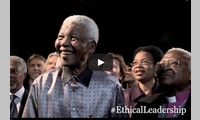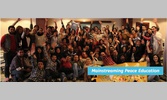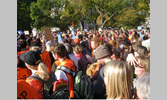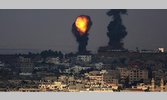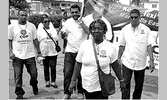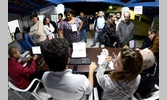
For those who watch or listen to the commercial media, it would seem that we have all lost our minds. Whether it is the events in Israel and Palestine or the Ukraine, or the way their events are treated in Paris and Washington, the news is filled with seemingly endless enmity and violence.
But if you read CPNN instead, you see that we are advancing towards a culture of peace in little steps throughout the world. A good example is the progress in Participatory Budgeting (PB) which is, in effect, democratic participation. News about PB may be found in local media, but not on the front pages of the international commercial media which does not consider it to be important. A number of these local stories are covered by CPNN this month.
As described in the CPNN article from Brazil, PB was first invented in Porto Alegre, Brazil, in 1989 and it is now reproduced in 3000 cities around the world in dozens of countries. It was recognized recently at the 14th Conference of the International Observatory of Participatory Democracy that took place in Brazil in June with over a thousand participants from 25 countries.
As the article describes, "The essence of Participatory Budgeting is to listen to people in public meetings for preparation and prioritization of programs and articles that guide the municipal government in the making of the municipal budget. The Participatory Budget Council, formed by society, organizes the collective demands of the citizens and refers them to the City Council who have the last word on the public budget."
The Brazilian article goes on to note that "the peoples' wisdom, contrary to the expectation of many city managers, selected as the top priority asphalting streets of neighborhoods and villages, especially where the bus passed, instead of health centers or schools. People did not want to step in the mud in the winter cold, and they wanted quality of life at their doorstep." This is illustrated in the case of Trenque, Argentina where the priorities decided by the people include jogging paths, parks, waste collection for recycling, and workshops or cooperatives for growing fruits and vegetables, sewing and making toys. And in Paraná, Argentina, the priorities are street and road improvement, enhancement of green spaces, street lighting and water or sewer improvement.
In Rosario, Argentina, another city that has long engaged in PB, there is now a separate substantial budget that is decided upon by youth between the ages of 13 and 18, thus guaranteeing that the practice will be passed on to future generations.
|
VIDEOS |
French Spanish |
Where it has been installed, PB gains the confidence of citizens. For example, in La Serena, Chile, there were over 10 times more people taking part in the diagnostic stage of the process this year as compared to 2013. Information technology is being applied to reach even more citizens, as described in the case of Ubatuba, Brazil.
More and more cities are taking up PB. For example, in Portugal, "for the first time in its history, the Board of Alcoutim is implementing a Participatory Budget for the municipality of Alcoutim, which will take effect from 2015, with an investment of 100 million euros." Citizens in New York City, inspired by what they saw in Brazil, first started PB in four districts of their city in 2011. Now, only three years later, 22 districts are using PB, committing at least $25 million to a public vote. Research shows that "the diversity of NYC is being represented in the process and new people are getting engaged: two-thirds of PB voters were women; 60 percent identified as people of color; 49 percent had less than a college degree; nearly half have household incomes less than $50,000; 32 percent were born in another country; 22 percent of ballots were cast in a language other than English; almost 70 percent had never worked with others in their community to solve problems; and 22 percent of PB voters identified barriers that made them ineligible to vote in traditional elections."
Although it is the newest way, PB is not the only way to increase democratic participation. In this regard, the Inter-Parliamentary Union, which has always been a leader in promoting democratic participation, is marking its 125th anniversary. "The oldest multi-lateral political organization in the world, IPU has played an important role in; the creation of the UN, inter-State relations during the Cold War; helping countries in post-conflict to transition smoothly into democracy, setting international standards on elections and parliamentary working methods and in increasing women’s political participation globally."
